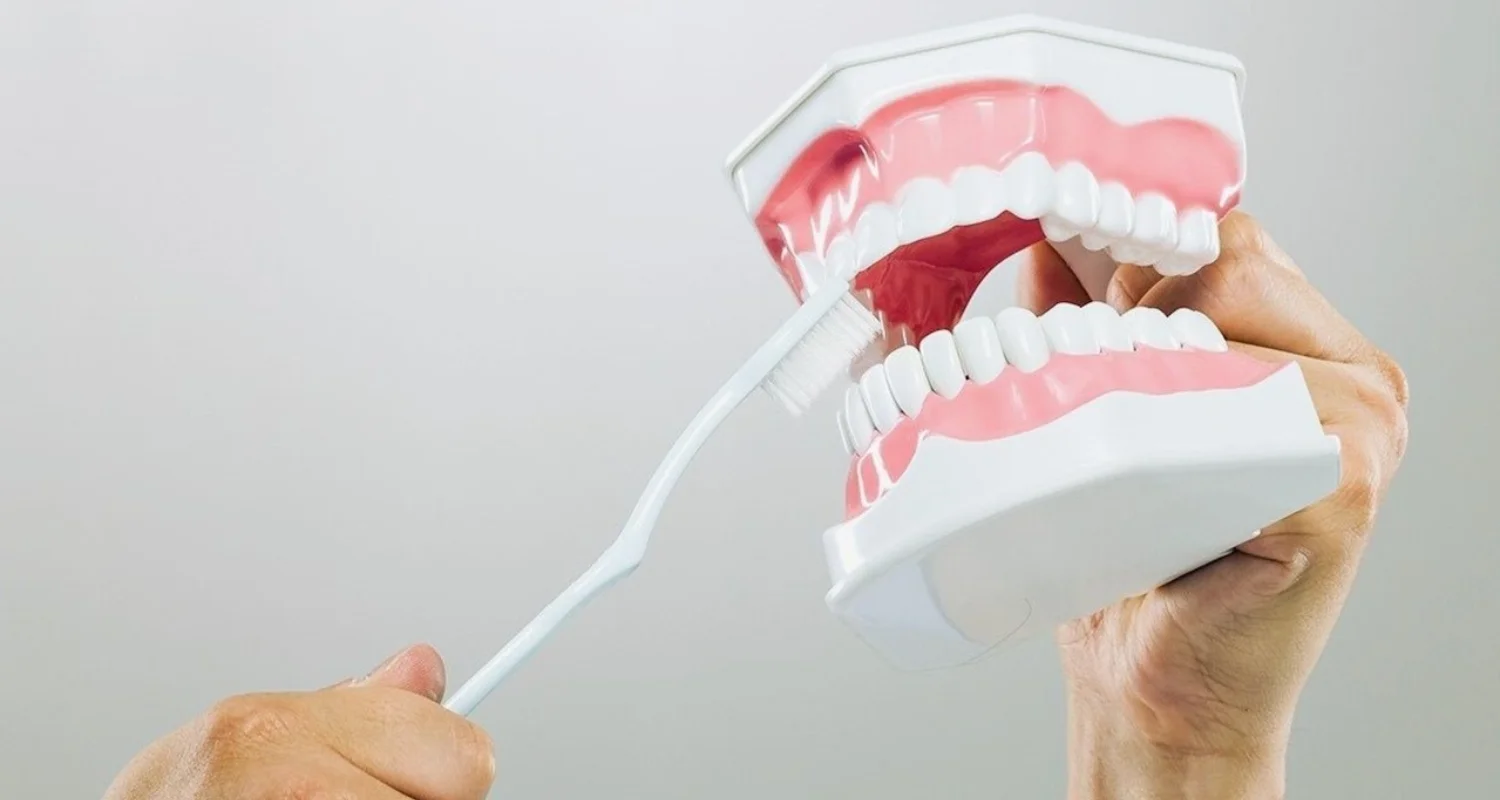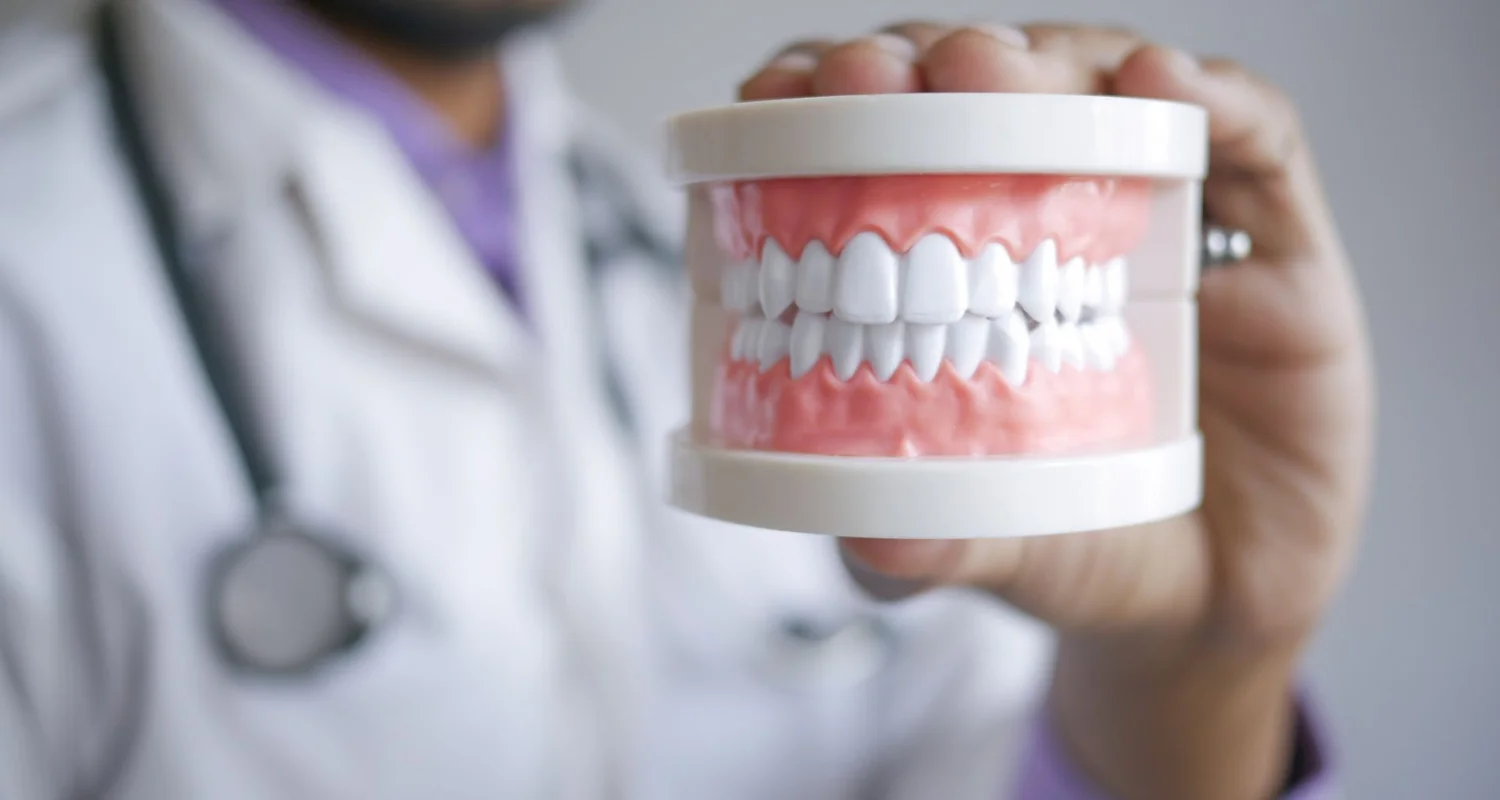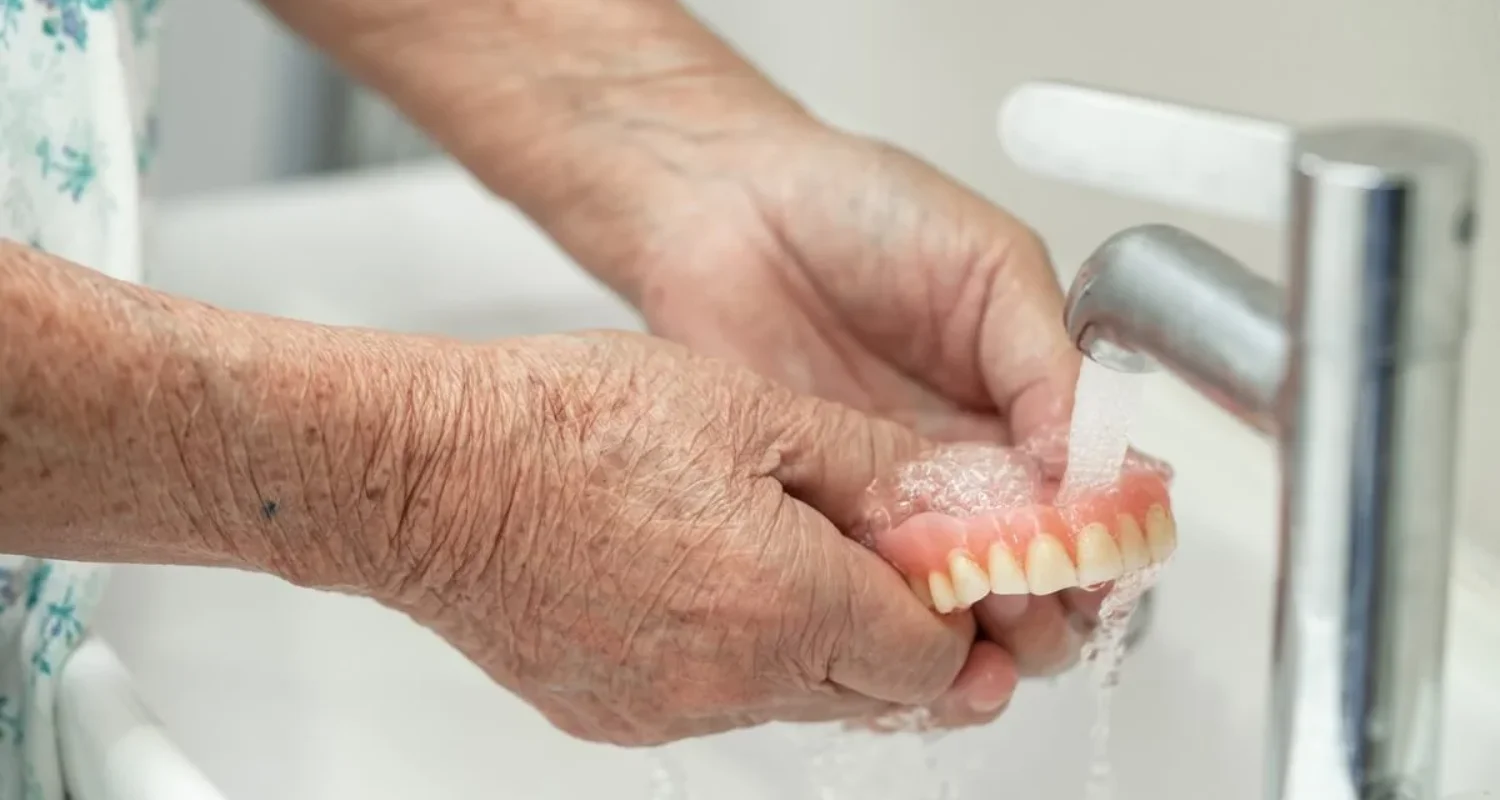Last Updated on: 20th December 2025, 07:38 am
Do you want to know the best denture care tips?
Caring for complete dentures goes beyond just keeping them clean—it’s essential for comfort, longevity, and oral health. For many, dentures are a key part of daily life, replacing natural teeth and restoring smiles.
However, they require specific care to prevent staining, odor, gum irritation, and even infections. Proper denture care involves a bit more than a quick rinse. Dentures are porous and can harbor bacteria, so a daily cleaning routine is essential. This not only helps prevent plaque and tartar buildup, but it also reduces the risk of oral infections.
In this article, we will take you through an entire schedule of denture care from simple cleaning practices to long-term care. Whether you have just begun wearing dentures or are seeking ways to enhance the practice, this guide will provide practical advice for keeping your dentures in great condition for years to come.
Best Practices for denture care
Partial or complete dentures, known as removable teeth, are very useful for replacing missing teeth and improving the overall appearance of an individual’s smile. Crafted to look as natural as possible, artificial teeth are made from materials like acrylic and metal to ensure durability and aesthetic appeal.
Despite being artificial, these teeth must be cleaned properly to stay in good condition and support overall oral health.
Denture care involves more than just brushing—there are specific steps to keep them clean, comfortable, and fully functional. Keep reading to learn everything you need to know about effective denture maintenance and more.
Full Dentures vs. Partial Dentures: Different Care Needs
Both full and partial dentures replace missing teeth, but they differ in structure and care. A full denture is, by definition, an appliance that replaces an entire arch of teeth, either the upper arch or the lower arch. It rests directly on the gums, whereas a partial denture is an appliance that replaces several teeth only, supported by the remaining natural teeth. The differences lead to various requirements to keep each of them effective and comfortable.
Denture Care for Complete Dentures
Full dentures require daily cleaning and overnight soaking to stay fresh and maintain their shape. Here are some specific tips for full dentures:
● Daily cleaning: Brush them gently with a soft denture brush and non-abrasive cleanser to remove food particles and plaque.
● Overnight soaking: Soak full dentures in a mild denture solution or plain water each night. This prevents them from drying out and helps keep them free of bacteria.
● Rinse before wearing: After soaking, rinse the dentures thoroughly to remove any residue from the cleaning solution before placing them back in your mouth.
Denture Care Tips for Partial Dentures
Partial dentures attach to natural teeth, therefore, it is crucial to protect them from undue wear or damage. Here are some care tips specific to partial dentures:
● Avoid toothpaste on attachments: Toothpaste can be abrasive and damage the metal clasps or other attachments on partial dentures. Use a denture cleanser or mild soap instead.
● Brush natural teeth and separately: Clean both your natural teeth and partial dentures thoroughly, but handle each part of your mouth separately. This ensures both are maintained without causing excess wear.
● Keep attachments intact: Handle the clasps and metal parts carefully to avoid bending or damaging them. Misalignment can create discomfort and may affect the denture’s fit.
Both types of dentures require daily care and gentle handling to remain comfortable and long-lasting. Following these specific routines will help ensure that each type of denture stays in optimal condition while supporting your overall oral health.
How Often Should You Clean Your Dentures?
Dentists recommend cleaning your dentures at least once a day, although twice daily is even better. Aim to brush them each morning and again before bed, ensuring they stay fresh and free of debris. In addition to brushing, soak your dentures every night in a mild soap or dental cleaning solution.
While it’s best to avoid regular toothpaste on dentures, you should still use it to brush your gums and tongue. This helps keep your gums healthy and prevents bad breath. If you wear partial dentures, remember to brush and floss your natural teeth daily to protect them from plaque buildup.
What to Avoid While cleaning your dentures
● Abrasive cleaners & stiff brushes: These can scratch and damage denture surfaces.
● Whitening toothpaste: May stain or alter denture color.
● Bleaching products: Chlorine can corrode metal parts in dentures and cause discoloration.
● Hot water: Can cause dentures to warp and compromise fit.
Can You Sleep with Dentures?
Dentists generally advise against sleeping with dentures. It is recommended that dentures not be worn continuously, day in and day out (24 hours daily) to minimize or reduce the chances of developing denture stomatitis.
Removing them at night allows for thorough cleaning and soaking, which softens the material for a more comfortable fit. It also gives your gums and jawbone a break from the constant pressure of wearing dentures.
Why Regular Dentist Visits Are Essential for Denture Wearers
Denture wearers need regular visits to the dentist to keep their dentures in good condition. It’s a great opportunity to have your teeth professionally cleaned, for your dentist to check on the fit of your dentures, and to monitor the health of your gums and mouth.
Often, small, early adjustments prevent much bigger problems and are far easier to solve. The dentist can also remove stubborn stains and buildup that are missed by daily home care, helping to keep your dentures looking and feeling their best.
Denture Care: The best and the worst foods
The best foods:
Opt for soft, non-sticky foods that are easy on dentures, like eggs, yogurt, and thoroughly cooked vegetables. Leafy greens and other foods that support gum health are also beneficial, helping to maintain the tissue that supports your dentures.
Foods to avoid:
Avoid hard-to-chew foods like nuts, popcorn, and hard candies, as they can damage dentures. Steer clear of sticky foods such as caramel and gum, which can dislodge dentures and make them difficult to clean.
Takeaway
Proper denture care is essential for comfort, durability, and oral health. A daily cleaning routine, cautious handling, and regular dental visits help prevent issues like staining, odor, and gum irritation, therefore, should be followed judiciously.
Along with this, choosing soft, non-sticky foods while avoiding hard or sticky items can further protect your dentures. Adhering to these practices will keep your dentures in optimal condition and support a healthy, confident, and long-lasting smile.
Frequently Asked Questions
How do I properly care for my dentures?
Proper denture care involves daily cleaning, overnight soaking, and careful handling. Start by brushing your dentures gently with a soft denture brush and a non-abrasive cleanser to remove food particles and plaque. Every night, soak your dentures in a mild denture solution or water to prevent drying out, which keeps them bacteria-free. After soaking, rinse them thoroughly to remove any cleaning solution residue. Additionally, avoid using abrasive cleaners or regular toothpaste, which can damage denture surfaces.
What is denture care?
Denture care refers to the daily practices needed to keep dentures clean, comfortable, and long-lasting. It involves more than just cleaning; denture care also includes soaking them overnight, handling them gently to avoid cracks, and visiting the dentist regularly for professional checkups. Proper denture care ensures the dentures remain in good shape, prevents staining, reduces odor, and minimizes gum irritation or infection risks.
Can I leave my dentures in water for a week?
No, leaving dentures in water for a week is not recommended. Dentures should be soaked in a denture solution or plain water overnight but should be removed, cleaned, and rinsed each day. Long-term soaking can lead to bacteria buildup, affecting denture hygiene and possibly creating unpleasant odors. Daily cleaning is essential to maintain their comfort, cleanliness, and fit.
Can I sleep with my dentures in?
It’s generally advised not to sleep with dentures in. Wearing dentures continuously increases the risk of gum irritation, infection, and denture stomatitis. Removing them at night allows your gums to rest and promotes better oral health. It also provides an opportunity to soak and thoroughly clean the dentures, making them more comfortable to wear.
How often should I visit the dentist for denture care?
Regular dental visits are recommended every six months for denture wearers. During these visits, the dentist can check the fit, adjust if needed, and professionally clean the dentures to remove any stubborn buildup. This will help maintain your dentures in top condition and ensure that your gums and mouth remain healthy.
Share
References
1. Nooji, Deviprasad & Lunia, Mayank. (2017). Post Insertion Problems and Management in Complete Denture Patients.
2. Higuera, V. (2021, February 1). How to Care for Your Dentures. Retrieved from https://www.healthline.com/health/denture-care#when-to-call-a-dentist
3. Hill, A. (2024, October 17). How to Clean and Take Care of Your Dentures. Retrieved from https://www.newmouth.com/dentistry/restorative/dentures/care/
4. Professional, C. C. M. (2024, May 1). Denture Care. Retrieved from https://my.clevelandclinic.org/health/articles/10901-denture-care
5. Team, C. D. C. D. (2023, June 1). How to Care for Dentures? Proper Care and Good Maintenance. Retrieved from https://www.customdentureclinic.com/how-to-care-for-dentures/#What_to_avoid_while_cleaning_dentures
-
Nayibe Cubillos M. [Medical Reviewer]
Pharmaceutical Chemestry |Pharmaceutical Process Management | Pharmaceutical Care | Pharmaceutical Services Audit | Pharmaceutical Services Process Consulting | Content Project Manager | SEO Knowledge | Content Writer | Leadership | Scrum Master
View all posts
A healthcare writer with a solid background in pharmaceutical chemistry and a thorough understanding of Colombian regulatory processes and comprehensive sector management, she has significant experience coordinating and leading multidisciplina...



















